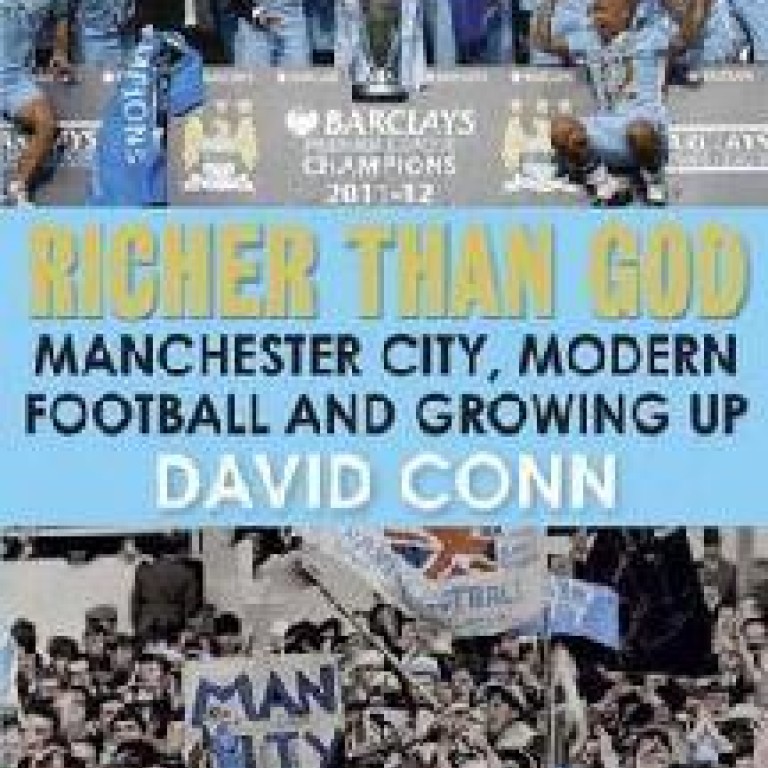
How City's billionaire buyer proved a game changer
Manchester City, who won the English Premier League last season, are the world's richest football club - or rather, the club with the richest owner, Sheikh Mansour bin Zayed Al Nahyan; the multibillionaire's oil-rich family rule Abu Dhabi.
Award-winning British journalist David Conn, a City fan as a child, began his book - about the sheikh's takeover and transformation of City, and its effect on English football - before their success.
by David Conn
Quercus
Manchester City, who won the English Premier League last season, are the world's richest football club - or rather, the club with the richest owner, Sheikh Mansour bin Zayed Al Nahyan; the multibillionaire's oil-rich family rule Abu Dhabi.
Award-winning British journalist David Conn, a City fan as a child, began his book - about the sheikh's takeover and transformation of City, and its effect on English football - before their success.
His absorbing account blends in his boyhood memories, from the joys of their last league championship in 1968 to the club's remarkable rebirth after the sheikh's £800 million takeover in 2008.
Conn casts a slightly melancholy gaze on the changes "mega money" has brought to English football, "the people's game". Over the past 20 years its leading clubs, including City, Manchester United, Liverpool, Arsenal and Chelsea, have become huge global businesses.
Since buying City, the sheikh has spent about £1 billion (HK$120 billion) "to build a team capable of sustaining a presence in the top four of the league and winning European honours".
Some of Manchester's most deprived areas are around City's Etihad Stadium - an unemployed adult over 25 receives £67.50 a week; in two years the sheikh bought 22 new players for £452 million; Carlos Tevez, the highest paid, earns £198,000 a week.
"It is difficult to accept that in a world where so many people live in poverty … one sheikh should have personal billions and spend one of them on footballers' wages to win shiny cups," Conn writes.
Up to the end of last season, when City won the title, the sheikh had been to Manchester only once to watch the team, Conn says. "He genuinely prefers to watch it at home on TV," the sheikh's spokesman, Khaldoon Al Mubarak, tells him.
Conn praises the sheikh and his staff as City's best owners "in my lifetime". He says the sheikh has been "contemptuously condemned" for "buying the title", but points out that British millionaire Jack Walker did the same at Blackburn Rovers in 1995, and billionaire Russian Roman Abramovich, at Chelsea, from 2003.
Yet Conn also agrees with the argument that it is "not football" to have a sheikh pour money into buying a team to win the league, rather than building a team on their own resources.
He prefers the way football is run in Germany and the Netherlands, where professional clubs are the centre of true community sports complexes, with dozens of amateur teams across many sports, and the senior football team at its apex.
He says English fans were told English football's success and huge crowds were the result of the breakaway by the top clubs and selling out to foreign buyers. Yet Germany has had its own remarkable revival - average crowds are up to 45,000, the world's highest average - which has been done with supporter-owned clubs charging ticket prices that young people can afford, he says.
"If a sheikh wanted to be involved in Bayern Munich, he could buy membership for €60 [HK$580], have an equal vote with 130,000 members and buy a ticket to stand behind the goal for a tenner," he writes.
Despite Conn's pleasure at City's title success, he admits part of him feels uneasy. "I do not want to live submissively, giving thanks to some superstars bought by Sheikh Mansour's millions, who would otherwise never have come to Manchester City."
